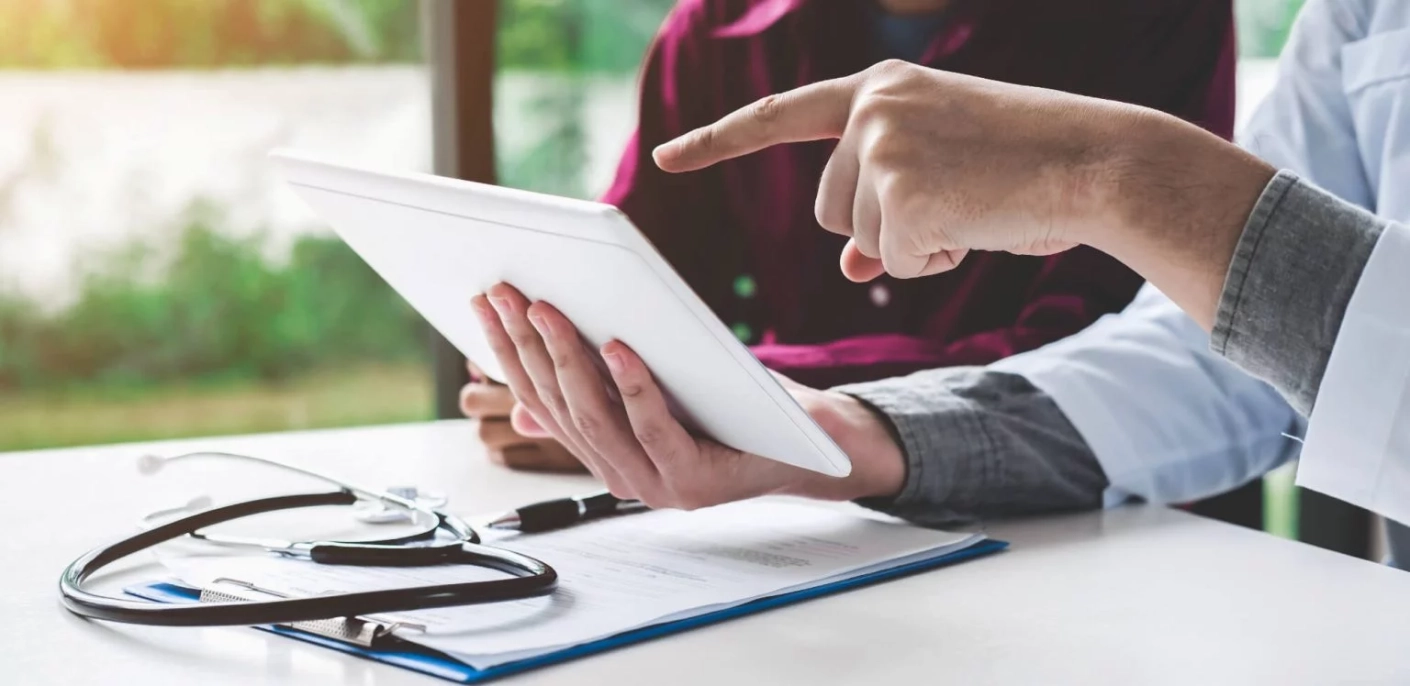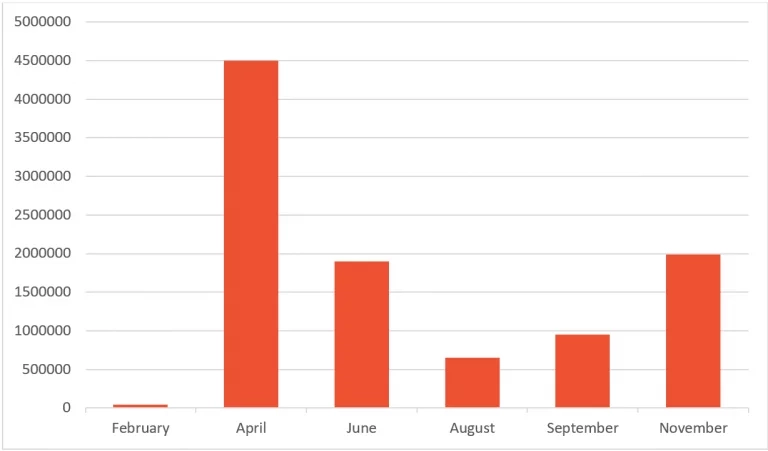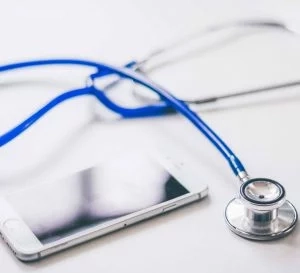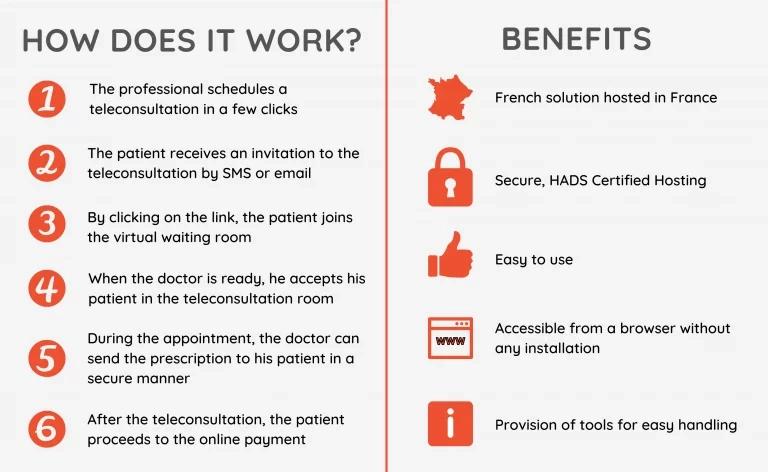Teleconsultation at the service of the territories



Major ally during the COVID-19 pandemic, teleconsultation has proven to be effective and efficient. Since the beginning of 2020, it has established as a complementary health tool to face-to-face consultation in a medical office. The implementation of teleconsultation solutions helps meet the challenges facing our health care system. By providing your territory with these tools, you allow healthcare players and patients to benefit from the many advantages of teleconsultation. It is in this sense that GCS e-Santé Bretagne has decided to deploy a telemedicine offer throughout the Brittany region.
After a timid beginning on the French market, teleconsultation has developed considerably with the COVID-19 pandemic. In fact, in 2020, 19 million teleconsultations were reimbursed by Health Insurance.
As a reminder, since September 15, 2018, the use of teleconsultation is covered by Social Security in the same way as a classic consultation according to the care pathway.
To encourage the French to consult their doctor remotely during the health crisis, the Government has relaxed the reimbursement rules for teleconsultations. They are now 100% covered for all patients by the Health Insurance. According to the Social Security Funding Bill, this measure will be extended until 2022 to facilitate the use of telemedicine by insured persons.
According to Health Insurance figures, teleconsultation fell gradually during the summer, dropping from 1.9 million acts performed in June to 650,000 in August. Since the start of the school year, its use increased again with 950,000 teleconsultations carried out in September and nearly 2 million in November. The progress of this practice shows that it seems to be taking hold in the habits of patients and doctors.

Evolution of the number of teleconsultations carried out in 2020
Independently of the health crisis, teleconsultation is an effective solution to compensate the challenges facing the French health system. This practice is not intended to replace doctors and does not replace traditional medicine. On the other hand, it improves the accessibility of quality care to all throughout the country, fights medical deserts and relieves congestion in medical offices and hospitals.

Inequalities in access to healthcare are increasing every year in France. According to a study by the Observatoire-Place de la Santé, in 2018, more than a tenth of the population, or 11.1%, lives in a municipality where access to a doctor is limited versus 7.6% in 2012.
The shortage of practitioners in some territories affects the time it takes to get an appointment, harming both patients and doctors. In addition, this leads to over-solicitation of healthcare professionals in the form of text messages, emails or calls. In rural areas, it usually takes tens of kilometers to see a doctor, which can be a problem for people who have difficulty getting around.
For all these reasons, many patients no longer consult and give up care. However, almost one in two consultations could be replaced by teleconsultation. Indeed, it allows to carry out a diagnosis, to give advice, to renew a prescription or to make a medical follow-up. As a complement to physical consultations, teleconsultation allows doctors to optimize their working time and patients to overcome constraints such as waiting time or the need to travel. Telemedicine acts reduce inequalities in access to care and remedy the problem of non-use of care.

The increase in emergency department attendance is linked to overcrowding in medical offices. Indeed, the demand for care is increasing while the number of general doctors is decreasing. Thus, many patients go to the emergency department because either their general practitioner is not available, or they do not have a general practitioner, or they have not been able to get an appointment with another doctor. In a report published on February 6, 2019, the Court of Auditors estimates that 20% of patients who come to the emergency department each year would be the task of town medicine.
For this reason, the use of telemedicine is encouraged by the Ministry of Solidarity and Health. Minor conditions (seasonal viral infections, cough, colds, etc.) and long-term illness that require follow-up care can be treated via teleconsultation.
Telemedicine also saves money by reducing unnecessary trips and emergency department visits. Indeed, teleconsultation allows a patient located in a medical desert area to consult his doctor remotely. As a result, he will no longer be forced to use medical transport (firefighters, ambulances) to get to the emergencies. Thanks to this practice, Health Insurance could save 2.2 billion euros per year.
One of the main challenges of the deployment of telemedicine is to provide an appropriate and comprehensive response across the country for all target populations. This requires the development of a logic of coordination and access to telemedicine and territorial organizations such as the GCS (Groupement de coopération sanitaire), the GRADeS (Groupement régionaux d’appui au développement de l’e-Santé) or the GHT (Groupement hospitalier de territoire) play an essential role in this development.
In Brittany, for example, it is the GCS e-Santé Bretagne that plays this role of architect of e-health in the region. It manages and coordinates shared projects enabling digital exchanges between all health professionals, whether they work in liberal cabinet, in health, medico-social or social institutions. In this context, the GCS e-Santé Bretagne offers the regional telemedicine service e-kerMed allowing secure exchanges between patients and health professionals.
Launched in 2019, e-KerMed meets the objective of better adapting to the needs of health actors in the region who wish to take part in telemedicine. It offers:
With more than 3000 professional users, e-KerMed equips for example the CHU of Brest, the CHU of Rennes, the CH of Saint-Brieuc, the CH of Bretagne Atlantique and covers many specialties such as anesthesia, dermatology, diabetology, nutrition, infectious diseases, general medicine, etc.
The operation is simple, in a few clicks, from his computer, tablet or smartphone, the professional can schedule a teleconsultation. The link is then sent to the patient by SMS or email. By clicking on the link, the patient joins the virtual waiting room. When the doctor is ready, he accepts his patient in the teleconsultation room. During the appointment, the doctor can send the prescription directly to his patient in a secure manner. After the teleconsultation, the patient can pay online if the doctor requests it.
Benefits of the solution:

The use of the e-Kermed teleconsultation platform has grown significantly linked to the COVID-19 pandemic, but more than a one-off phenomenon, the practice of teleconsultation seems to have become firmly established in uses. According to the February 2021 dashboard of the GCS e-Santé Bretagne, since February 2020, we have counted:
The deployment of telemedicine in a territory is a considerable project, but essential to meet a medical need. Do you want to set up a telemedicine solution in your territory? At Apizee, we can offer you a French turnkey solution or as an API to integrate into your portal, hosted in France.
Discover our solutions for telemedicine Contact-us for a demo
Read also:
Explore key findings from the Genesys State of Customer Experience report. Learn how AI, omnichannel strategies, and video chat are transforming CX and enhancing customer satisf...
The State of Customer Experience report by Genesys : Key Insights and Trends
27 Mar 2025
Despite AI and automation, customers still prefer to speak to a human for support. Discover why human interaction remains essential for great customer service.
Why Customers Still Want to Speak to a Human in Customer Service
17 Mar 2025
Discover the top customer experience influencers in Europe, shaping the future of CX and customer service.
Top 100 Customer Experience Influencers to follow
10 Mar 2025
Interested in our solutions?